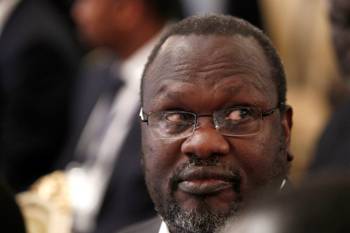S. Sudan rebels reiterate commitment to Arusha process, say talks should not be in Juba
June 23, 2015 (NAIROBI) – South Sudanese rebels of the armed opposition faction of the Sudan Peoples’ Liberation Movement (SPLM-IO), led by former vice-president, Riek Machar, said they were committed to the Arusha reunification process of the ruling party, but said Juba was not the right venue for the dialogue.

However, he said their SPLM faction’s representatives could not go to Juba as a venue for further dialogue because war was still raging on between their rival forces, making the national capital under the government’s control not conducive for such a dialogue.
Dak was responding to the recent developments in Juba in which the group known as former detainees led by the Tuesday’s reinstated party’s secretary general, Pagan Amum, decided to return to Juba and rejoined the party faction under president Salva Kiir on the basis of implementing the Arusha roadmap agreement.
On 21 January 2015 the three factions of the SPLM in government, SPLM in opposition and the former detainees signed the Agreement on the Reunification of the SPLM in Arusha, Tanzania and vowed to work together to secure reforms and national unity. Arusha roadmap accord, also, aims to support the IGAD-brokered process aiming to end the violent conflict that erupted on 15 December 2013.
A month later, the parties on 17 February agreed on the implementation mechanisms and called on South Sudan’s president Salva Kiir, who is also the chairman of the SPLM-in government to revoke the decision that dismissed party leaders.
But the rebel spokesman in response to the decision taken by Amum’s group said the former detainees abandoned the spirit of the tripartite dialogue in Arusha and opted for “the half-baked bilateral” understanding with the government in Juba.
“This has not come as a surprise. We already doubted their intentions. We all along suspected that these former detainees were leaning towards abandoning the tripartite dialogue and resorting to half-baked bilateral understanding with the regime in Juba,” Dak said.
“On our part we are also for the reunification of the party, but there still issues to be tackled first in Arusha and also its full implementation should be connected to signing of a peace agreement in the IGAD-led process in Addis Ababa,” he added.
He explained their differences with the former detainees were that the former detainees seemed to only believe in mere reunification of the party and reinstating their members back to their previous positions unlike the SPLM-IO, which he said, wanted the process of transformation and reforms to be tackled in Arusha.
The rebel leader’s spokesman further explained that their faction wanted the Arusha intraparty agreement to be translated into a new constitution using the SPLM draft constitution as well as draft other party’s basic documents such as code of conduct, internal regulations and manifesto.
He said SPLM-IO would want to see the party’s highest executive organ, the political bureau, to be restructured in accordance with the Arusha roadmap agreement and its membership expanded, including expanding the membership of the national liberation council.
Dak also added that the issue of leadership of the party should also be discussed in Arusha in view that a long awaited national convention failed to take place in May 2013 when a new leadership should have been elected by the convention.
“We want the party’s transformation and reform processes which Salva Kiir violently interrupted in Juba in December 2013 to be first tackled in Arusha. Rushing to reinstatement to previous positions and hoping that Salva Kiir will now agree in Juba to implement the reforms while he continues with the war is unrealistic dream,” he said.
He said the rebel faction was committed to the party reunification process in Arusha, saying the issue with also discussed between the opposition leader Machar and the president of the Republic of Tanzania, Jakaya Kikwete, on the sidelines of the last week’s African Union’s summit in Johannesburg, South Africa.
He also said unlike the former detainees, SPLM-IO faction has forces on the ground. He explained the rebel movement wanted a peace agreement in Addis Ababa which will have addressed issues of governance, security arrangements, institutional reforms, compensation and reparation of victims and reconciliation mechanisms, among others.
He concluded that the “dismantling” and return of the former detainees to the “regime” in Juba would also stop some of the confusions the group, sometimes known as G10, were causing in the IGAD-led peace process as they would now probably become part and parcel of the government’s delegation and position.
(ST)
